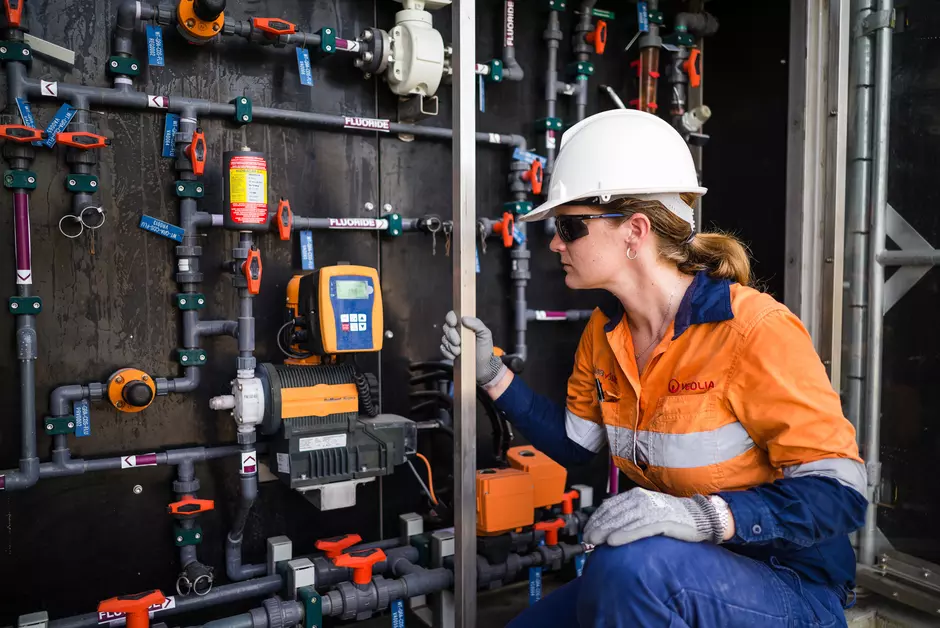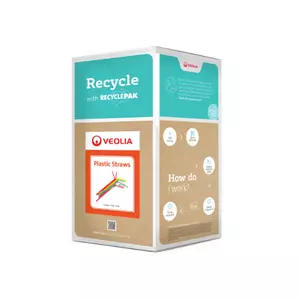Richard Kirkman, the Chief Executive Officer of Veolia Australia and New Zealand, says there’s an opportunity for Australia to “do something different” and forge a new, sustainable, green sector that will bring more jobs, resource recovery and renewable energy.
On the back of a new Federal Government that is keen to do more to act on climate change, and a push by individual states for a circular economy, Richard says it’s the right time to offer solutions that create better environmental outcomes.
“There’s a huge opportunity to fill that gap between just disposing of materials to getting some use out of them,” he says.

Richard says Veolia is taking a leading role. He says the merger of Veolia and Suez in March 2022 gives customers access to more people with more ideas. And while bringing two large organisations together is always going to be a roller coaster, he says staff are enthusiastic about their mission of ecological transformation and about what the new entity can offer the industry. As well as a wider geographical reach, the merger opens the door to new markets.
“We have a varied customer base from a local grocer through to big customers and Blue-Chip clients,” Richard says. “Everybody can have something that improves their sustainability.
“For the very small customer, it might mean how can we help them get more cardboard out of their residual waste stream. At the other end we have customers with solar panels, PFAS or other waste that is difficult to recycle. We have solutions for those items too.
“There’s synergy between the teams we have and as we work together, we will continue to open doors to new avenues. It’s incredibly exciting.”
One of the new services Veolia is offering is RECYCLEPAK, a door-to-door solution for hard-to-recycle items such as toothbrushes, safety glasses, hard hats and plastic straws.
The prepaid recycling boxes are an opportunity to get back large quantities of items that have previously had no recycling point. The materials collected are sent to a licensed recycling facility where they can be processed, and reused, which is in line with Australia’s shift away from landfill.
Richard sees the diversion from landfill, particularly for organic waste, as progressive and says Veolia has significant capacity to use anaerobic digestion to convert green waste into energy.
A refit of the company’s 50,000 tonne anaerobic digestor in Camellia, expected to be operational in early 2023, will provide a circular economy outlet for food manufacturers. There are also opportunities to integrate recycling and processing facilities on site for food manufacturers. Several distilleries are already reaping the benefit of on-site processing.
“Through anaerobic digestion we capture the energy from their solid organic waste,” Richard says. “The organic matter decomposes and produces a gas. That gas is then used to treat their water.
“They have a whole integrated system where energy is optimised. They can grow their business and have less impact on the environment – it’s a perfect situation.”
What’s not a perfect situation, says Richard, is the cost of waste disposal and who bears the brunt of it. He is advocating for a pay as you buy system, or extended producer responsibility, to better connect the entire supply chain to achieve Australia’s recycling targets and shift away from landfilling.
He believes the only way to optimise recycling and prevent items being made from materials that are hard to dispose of, is to work together.
Richard says if everyone pivots to making decisions with environmental outcomes in mind, we’d solve the current disposal problem without increasing costs. Manufacturers need to make products that are recyclable, retailers need to label them consistently, local authorities need to harmonise collections and the waste sector needs to invest in recycling technology. Above all, government needs to create a level playing field through mandatory policy, and consumers need to pay for disposal as they buy products.
“Hard to recycle items cost more to dispose of and the entire supply chain pays the price,” Richard says. “If manufacturers were incentivised to make materials consistently recyclable in the first place, we could move away from landfilling and keep materials in the loop for longer.”
He says consumers would still pay the cost of disposal, but instead of paying councils through their rates, they’d pay up front when they purchase packaged items. It’s not a matter of consumers needing to pay more, it’s about shifting the cost, and optimising the supply chain, so that those with the greatest ability to improve the packaging material on the market can make it recyclable, taking Australia one step closer to ecological transformation.
“If everyone changes the way they do things we can further optimise costs, this isn’t a cost increase. When you buy products, for example a plastic tray, you pay for the plastic it’s made of, you pay for the energy to manufacture it, the transport and the labour of getting it on the supermarket shelf,” Richard says.
“You don’t pay for the fact the tray will be thrown away or disposed of. Whether you decide to put it in a rubbish bin or recycling bin, it has a different cost for either councils, recycling facilities or Container Deposit Schemes.
“If you embed it into the purchase cost it’s all paid for upfront. It would put the incentive in the right place for recycling and making something recyclable.”
Richard describes it as similar to a Container Deposit Scheme where you pay upfront to be part of the scheme.
Read the full article here.
MEDIA CONTACTS
Dan Pagoda, External Relations Manager | +61 408 753 982 | [email protected]
Veolia Group aims to become the benchmark company for ecological transformation. Present on five continents with nearly 220,000 employees, the Group designs and deploys useful, practical solutions for the management of water, waste and energy that are contributing to a radical turnaround of the current situation. Through its three complementary activities, Veolia helps to develop access to resources, to preserve available resources and to renew them. In 2021, the Veolia Group provided 79 million inhabitants with drinking water and 61 million with sanitation, produced nearly 48 million megawatt hours and recovered 48 million tonnes of waste. Veolia Environnement (Paris Euronext: VIE) achieved consolidated revenue of 28,508 billion euros in 2021. www.veolia.com



